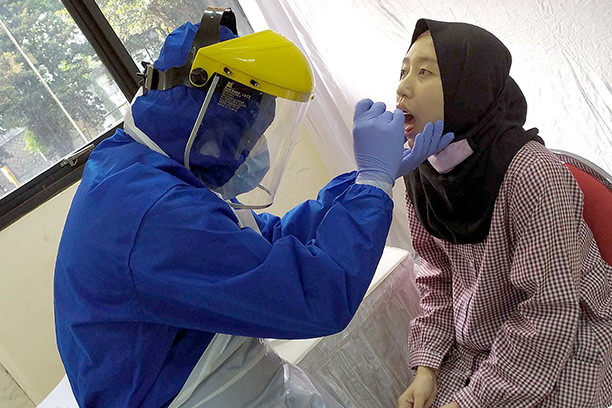Popular Reads
Top Results
Can't find what you're looking for?
View all search resultsPopular Reads
Top Results
Can't find what you're looking for?
View all search resultsPandemic priority: Anything but testing
Despite COVID-19 awareness-raising campaigns, suspected COVID-19 cases and close contacts of confirmed cases are still having difficulty getting a polymerase chain reaction (PCR) test.
Change text size
Gift Premium Articles
to Anyone
I
t has been over nine months since President Joko “Jokowi” Widodo announced the first COVID-19 cases in Indonesia in March, but the country has yet to see much improvement in its testing rate.
Despite COVID-19 awareness-raising campaigns, suspected COVID-19 cases and close contacts of confirmed cases are still having difficulty getting a polymerase chain reaction (PCR) test.
Banjarnegara resident Tati, 46, for instance, had a chronic cough and a fever, but the community health center (Puskemas) she visited was unable to conduct a PCR test.
“When I went to the Puskemas for the second time, [the doctor] asked me to get a PCR test at the Regional General Hospital [RSUD],” she told kompas.id last month.
As she had close to zero knowledge about COVID-19, the doctor’s suggestion confused her.
However, she followed the suggestion and went directly to RSUD Hj. Anna Lasmanah in Banjarnegara, Central Java.
She said the test ran smoothly, but it cost Rp 700,000 (US$49.56).
The test is considerably expensive for some people, including Narti, an ojek driver (motorcycle taxi), who works to transport Puskemas staff and patients every day.
Lukman, a resident of Cibinong, West Java, encountered a different obstacle to getting tested at RSUD Cibinong.
“I recently found out that we can only get a PCR test at RSUD Cibinong after taking a rapid test. If the result is non-reactive, then we cannot get a PCR test,” he said.
Read also: Without govt support, COVID-19 testing remains low in Indonesia
Bogor Health Agency secretary Achmad Zaenudin admitted that the local administration was no longer providing a budget for mass testing with PCR, explaining that they were now directing the budget to a self-isolation facility.
He reasoned that COVID-19 management included an active role of the community in preventing the spread of the disease and that family clusters had accounted for many recent cases.
“It would be a waste of money if we only prepared the equipment for the PCR test,” he said.
Banjarnegara regency is also not prioritizing mass testing.
According to data provided by the Central Java provincial administration, the testing rate in Banjarnegara is still below the World Health Organization’s (WHO) recommendation, which is one test per 1,000 people per week. At the end of October, the regency’s testing rate was only 151 people per week, while it was supposed to be 928 people per week.
However, the regency only allocated Rp 13.7 billion, or 0.6 percent, of the regional budget (APBD) for COVID-19 mitigation efforts.
The minimal budget was not due to other factors, as the regency continued to boost infrastructure projects.
Banjarnegara regent Budhi Sarwono has ensured that the local administration will not reduce the road construction budget of Rp 300 billion despite the pandemic.
“What COVID? Infrastructure projects [are necessary] because they are public facilities. People are working. Infrastructure [projects] are the main priority of regional heads. We don’t need to think about education or health. We need to provide access,” he said in Nov.
In June, President Jokowi called on regional administrations to quickly disburse funds for the response to the COVID-19 outbreak.
Jokowi said it was crucial that every governor, regent and mayor fast-track the reallocation of regional budgets (APBD) to bolster the health and business sectors in their respective communities.
Furthermore, he said he expected the budget reallocation to improve the distribution of social aid, which had previously faced hurdles due to several factors including data errors. (jes)
Editor’s note: This article is part of a public campaign by the COVID-19 task force to raise people’s awareness about the pandemic.










